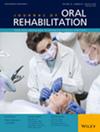Perioperative Changes in Oral Function and Association With Oral Food Intake Status in Patients Undergoing Gastric and Oesophageal Cancer Surgery
Abstract
Objectives
Perioperative oral health care traditionally focuses on oral hygiene to prevent post-surgical infection, with limited attention to oral function. This study explores perioperative changes in oral function in association with oral food intake in patients receiving gastric or oesophageal cancer surgery.
Methods
Patients who underwent surgery for gastric or oesophageal cancer at a university hospital and visited its outpatient dental centre for perioperative oral health care were recruited from August 2018 to March 2021. Several oral function parameters (lip-tongue motor function, tongue pressure, occlusal force, oral dryness and dysphagia score) were measured 1 day before and 7 days after treatment. The patients were categorised into the oral intake (PO) and non-oral intake (NPO) groups based on oral food intake status at 7 days post-surgery, and perioperative changes in oral function were analysed using the Wilcoxon signed-rank test between the PO and NPO groups for both gastric and oesophageal cancers.
Results
Of the 298 gastric cancer patients and 71 oesophageal cancer patients analysed, 87% and 24% of patients, respectively, were capable of oral food intake at 7 days after surgery. In gastric cancer patients, oral hygiene, tongue pressure and dysphagia scores significantly worsened in the PO group. In contrast, oral hygiene, tongue pressure and dysphagia scores were all significantly worsened in the oesophageal cancer NPO group, but not in the PO group. Oral dryness and occlusal force did not change remarkably regardless of oral food intake status in these patients.
Conclusions
This study uncovered a significant decrease in oral function in oesophageal cancer patients without postoperative oral food intake, suggesting a potential association between impaired oral motor function and delayed oral intake recovery. Accordingly, perioperative oral function management alongside oral hygiene care is advisable for early resumption of oral food intake.


 求助内容:
求助内容: 应助结果提醒方式:
应助结果提醒方式:


